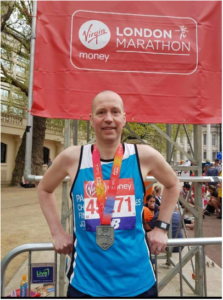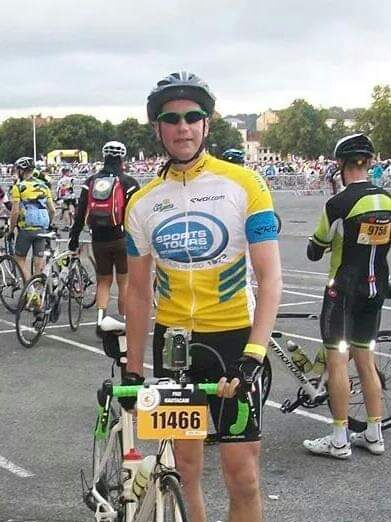An interview with Andrew Hobbs on Advocacy and Marathons on February 7, 2024 by George Ackerman, Ph.D, J.D.

Biography
Born in 1965, I have lived in the Midlands all of my life. I worked in IT for my professional career until Parkinson’s forced me to quit in 2018, aged 53. I was diagnosed with Parkinson’s in 2014, though like many others, can trace my symptoms back a number of years before, probably all the way back to the mid-1990s in my case. I was training during the summer of 2014 to ride the Etape du Tour, and while doing intervals at 100% HR Max would find my body tremor uncontrollably. As event participation involved a doctor’s certificate, I waited until after the event to consult my GP.
Can you tell me more about your advocacy?
I was shocked just how little support there was, in particular during the period immediately following diagnosis. Support groups for working people were very difficult to find, and most if not all Parkinson’s UK group meetings were in the day. I started a support group with another working age patient to fill that gap, and we now have 20 people who help and support each other, and we try to meet monthly. For any newly diagnosed patients, I don’t think anything will improve your journey more than finding (or creating) and joining an age-appropriate support group.
I still think that Parkinson’s is very poorly understood by the public, but so many celebrities disappear into the background when they are diagnosed that ASCA community, we lack a voice that the masses are interested in listening to.
I volunteer for PUK (RSN), I am a PD Avenger (research arm), I am a trustee at Spotlight YOPD, I am the treasurer of the England Parkinson’s Disease Golf Society
I’ve been training as a counsellor and provide free services to the PD community (including carers and family members)
What is your passion and how did you get involved in Parkinson’s awareness and hope for a cure?
I get frustrated when people refer to Parkinson’s as incurable and always correct them by adding “currently” to their statement. I have read as many research documents as I can find, and have made lifestyle and dietary changes as a result. I monitor my progress on PRO-PD app and the results show that I am positive deviant in terms of my progression against time – to all people with Parkinson’s please understand that you can make changes that categorically WILL change your life journey for the better. My daughter is a doctor of microbiology, and so can translate research documents that are written by scientists for scientists when the text is too much for my “Mathematics and Computer Science” graduate brain.
But I’d say my main passion is for sport. Sport provides an instant support network, prevents isolation, and gets you moving. I’m a part of the Walking Football community, and have been selected to play for the national Parkinson’s Walking Football team. We travel nationally and internationally promoting the benefits of walking football, and explaining how we have managed to grow the opportunities to participate for PwPs in the hope that they might do the same.
My other passion is golf, which I temporarily gave up for 5yrs when dx’d. We’ve created a Golf Society for PwPs and it would be great if Parkinson’s golfers in other countries did the same. Who knows, maybe we could compete internationally in something like the Ryder Cup for PD golfers, so please pass that idea on to your American friends.
What type of goals do individuals with Parkinson’s have when seeing your advocacy?
I’d say the goals are to have access to a support network, and to understand how they can make this journey better.
I try to remain as active as I can, playing walking football, golf, swimming and even going to the gym. I have to time my medication to fit with my participation, and particularly for golf, the medication planning is the most important factor in how I play. Most of the people I meet playing sport are keen to remain as active as they can for as long as they can. Seeing the improvement in mobility of some of the walking football players, you’d think they had been prescribed a new wonder drug! I’ve seen people get out of wheelchairs at the side of the pitch, get onto the playing surface with a stick and then come alive when the ball arrives at their feet.
I hope that my advocacy encourages even one person to take up a sport with a dedicated Parkinson’s team. I’d say in 99% of the cases where they do, their lives with pd will improve for it.
What type of training and how long are the programs?
I’ve had no advocacy training, though did apply for a place on the EUPATI (https://toolbox.eupati.eu/) course a few years ago. I joined Spotlight YOPD, the only UK charity dedicated to supporting the needs of young Onset patients, in January 2022, my fellow trustees have certainly helped to improve my skills as an advocate. I funded my way through a counselling course, I’ve trained for just over a year so far, with the aim of making these massively underserved needs in the community available to those that can’t afford to access them otherwise..
What effect can your advocacy have on an individual with Parkinson’s?
Life with Parkinson’s can be hard, so the only effect i am interested in is improving people’s lives.
If I can help a patient improve their mobility, their mood, their access to information or just their ability to measure their progress, this can have a huge impact on their quality of life. The satisfaction and emotional benefits that I get by helping someone in need are hard to quantify, but they are certainly enough to make me want to do more.
What would you like to see as a future goal for your advocacy?
I’d like to complete my counselling training (level 4) finance permitting and help others take on the same journey. Imagine having a pool of qualified therapists on hand to provide support for the community’s mental health that they simply can’t currently afford to access. I’d like to find the funding from government or anyone altruistic enough and wealthy enough to train a team of counsellors, and the counsellors pay back into the pd community by giving their time for an agreed number of hours per week post qualifying. It’s a model that works well on paper but is beyond my means to get started.
What events do you participate in?
I am fortunate enough to have been selected as the England Parkinson’s Walking Football goalkeeper, a huge honor, fulfilling a lifetime ambition to play football for my country. I’ve also represented England in the Four Nations Golf Tournament at the Belfry, organized by Sport Parkinson’s, an organization I’d recommend every patient to look up (https://www.sportparkinsons.com)
How does your advocacy also assist caregivers?
I counsel carers as well as patients, and make myself available to carers to ask any questions that they might be uncomfortable asking the person they care for.
How can someone get in touch? What is your website?
I have a website www.drewstersmillions.co.uk but people can contact me through Facebook (I’m an admin for PDFU and Young Onset Parkinson’s UK Facebook groups) via the Spotlight YOPD charity, via Sport Parkinson’s, via the England Parkinson’s Walking Football team, via LinkedIn… I’m really not difficult to find if you’re looking.
How can others also become advocates for awareness?
Join a charity in a field that you have an interest in, and let it grow from there
If you had one final statement or quote you could leave for the Parkinson’s community, what would it be?
Science WILL find the answers, you need to be the best you that you can be for the day that happens.

